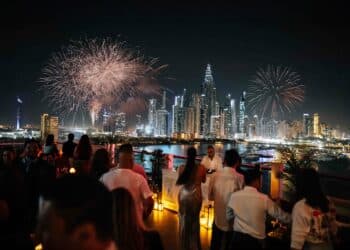A new report has revealed there is every reason to be positive about the future of hospitality in Dubai.

The report, which has been released by real estate consultancy Knight Frank, compared Dubai against a number of leading cities across the world – New York, London, Paris, Singapore, Hong Kong, Shanghai and Sydney – across the key across the four key sectors of manufacturing and logistics, business and financial services and tourism.
Ali Manzoor, associate partner, Head of Hospitality commented on the Dubai hospitality market’s recent performance and outlook.
“Despite facing challenging market conditions, Dubai’s hospitality sector remains amongst the top performers in the Middle East, underpinned by the Emirate’s positioning as a regional commerce hub and the development of world class demand generators,” he said.
“Visitation has for the most part continued to grow from key source markets, with India and China notable standouts, and Russian visitation continuing its positive momentum from the previous year. We remain optimistic about the future outlook of the sector, and envisage that the market will once again stabilise once the rate correction has run its course.”
The report reads that for Dubai the tourism market has historically been a strategically important sector. In 2017 it is estimated that the sector contributed over AED150bn to GDP (4.6% of GDP), and provided almost 570,000 jobs (4.8% of total employment).
The sector’s direct contribution to GDP has increased by 138% in the 10 years to 2017 with employment in the sector growing by 119% over the same period.
This trend has been driven by the increasing level of connectivity on offer from DXB. DXB, the world’s largest airport by international traffic, recorded 83.7 million passengers in 2016, up 26% from 2014. In 2017 this has increased further to over 88 million passengers.
Whilst Dubai’s appeal is broad, the Emirate has established itself as one of the most luxurious destinations in the world. Currently it is home to 104 five star-hotels as per Dubai Corporation of Tourism & Commerce Marketing and forecasts indicate that there are 53 hotels five-star hotels in planning or construction with opening dates before 2020.
In addition to this, Dubai’s average spend per overnight visitor is estimated to be over $US2, 000 in 2017, the highest amongst our global hub cities.
Delving deeper into Dubai’s hotel sector, the total number of hotel keys per resident is highest amongst our global hub cities at 29.9 per 1,000 in Dubai. Although this is not a surprise given the disparity in populations between Dubai and these cities, what is surprising is the speed at which the number of keys has grown, up 150% in the 10 years to 2017.
Key Findings:
- Dubai International Airport (DXB), the world’s largest airport by international traffic, recorded 83.7 million passengers in 2016, up 26% from 2014. In 2017 this has increased further to over 88 million passengers.
- In the hospitality sector, the total number of hotel keys per resident is highest at 29.9 per 1,000 people in Dubai, compared to our selected hub cities. Paris is the next highest with 17.6 keys per 1,000 people.
- Currently Dubai is home to 104 five star-hotels (Dubai Corporation of Tourism & Commerce Marketing).
- STR global indicates there are 53 hotels five-star hotels in planning or construction with opening dates before 2020
- Dubai’s average spend per overnight visitor is estimated to be over $US2, 000 in 2017, the highest amongst our global hub cities.


































































